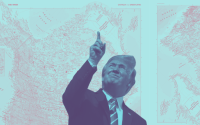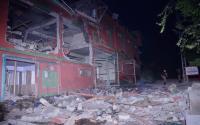Rory McCarthy in Qatar and Ewen MacAskill in NassiriyaWednesday April 16, 2003
The US and British governments yesterday formally began the tortuous process of steering Iraq towards a democratic future, but the first day of talks was undermined by technical delays, schisms and fierce political and religious unrest sweeping across the country.
The meeting, at the Talil airbase outside Nassiriya, went ahead despite a boycott by the main Shia Muslim group in Iraq. The Supreme Council for the Islamic Revolution in Iraq is Iranian-backed, and if it foments unrest, its actions could increase tension between Washington and Tehran.
The meeting ended with only the broad outlines for a new government agreed.
In spite of the setbacks, Jay Garner, the retired US general who has been put in charge of reconstruction, declared at the start of the meeting: "A free Iraq and a democratic Iraq will begin today."
As Iraqi exile groups sat down with selected Iraqis from within the country, there was a huge Shia demonstration in Nassiriya calling for rule by their ayatollahs. Residents overwhelmingly expressed disapproval of Ahmad Chalabi, an exile who is being pushed by the Pentagon as the next Iraqi leader.
There was also Shia unrest in Basra and Kut, and trouble in the north of the country, in Mosul. Hundreds more led demonstrations in Baghdad against the continued descent into lawlessness.
Despite a promise by the US president, George Bush, that the UN would have a "vital role" in Iraq, it was not invited to attend the Nassiriya meeting.
In an early embarrassment, the senior American officials who were to chair the event, including Mr Bush's special envoy, Zalmay Khalilzad, were more than four and a half hours late arriving at Nassiriya. Their C-130 Hercules aircraft had broken down on the runway in Qatar.
The meeting was conducted under tight US military security.
The Hercules, which also brought in British officials, dropped to a height of 200ft for the last 30 minutes of the journey as the crew, wearing bulletproof jackets, dumped excess fuel to make a rapid landing.
US marines, standing behind barbed wire, blocked access to Iraqis wanting to attend the meeting.
One of those outside, a former Iraqi major, Zamil Hamid, 54, said: "I tried to participate but they do not allow me to. One of the US soldiers told me I was not on the list."
Despite bold promises of peace and imminent democracy from the Nassiriya gathering, American soldiers were still struggling to enforce security across Iraq.
A riot erupted in Mosul as the new self-styled governor tried to address a crowd. At least 12 people were killed and 60 injured as US troops tried to restore order.
Diplomats had said privately that simply holding yesterday's meeting without it descending into a bitter dispute would be regarded as a success, however modest. Many of the speeches met with lukewarm applause and the most vital questions for the future remained unanswered.
"What model will we use?" asked Hoshyar Zebari, an official from the Kurdish Democratic party. "Will it be the Afghan model, will the United Nations be involved, what will be the role of the opposition? These are all things we have to decide."
Mr Khalilzad tried to encourage the Iraqi representatives to work quickly towards an interim authority. "We want you to establish your own democratic system based on Iraqi traditions and values," he told the meeting.
"I urge you to take this opportunity to cooperate with each other."
A statement at the end of the meeting set out a 13-point framework for a new government. It was unclear who had suggested the points and whether the Iraqis had voted on any issue, other than the decision to meet again in 10 days.
"The first vote of free Iraq should be about when the next meeting is," Gen Garner said.
The statement said the future Iraq should be a democratic, federal system and one not based on communal identity. It stressed the rule of law and the role of women, and said the meeting had discussed the relationship between religion and the state, although it did not appear to come to any agreement on this issue. The Ba'ath party, through which Saddam Hussein exercised ultimate control, was to be dissolved. "Its effects on society must be eliminated," the statement said.
Several more meetings will be held in the weeks ahead before a final interim Iraqi authority is drawn up. "There should be an open dialogue with all national political groups to bring them into the process," the statement said.
US officials who attended the meeting said they were likely to present their own proposals at the next gathering, an idea that many of the fiercely nationalistic Iraqi groups are likely to find disconcerting.
Mr Chalabi sent a representative to the meeting but did not attend.






